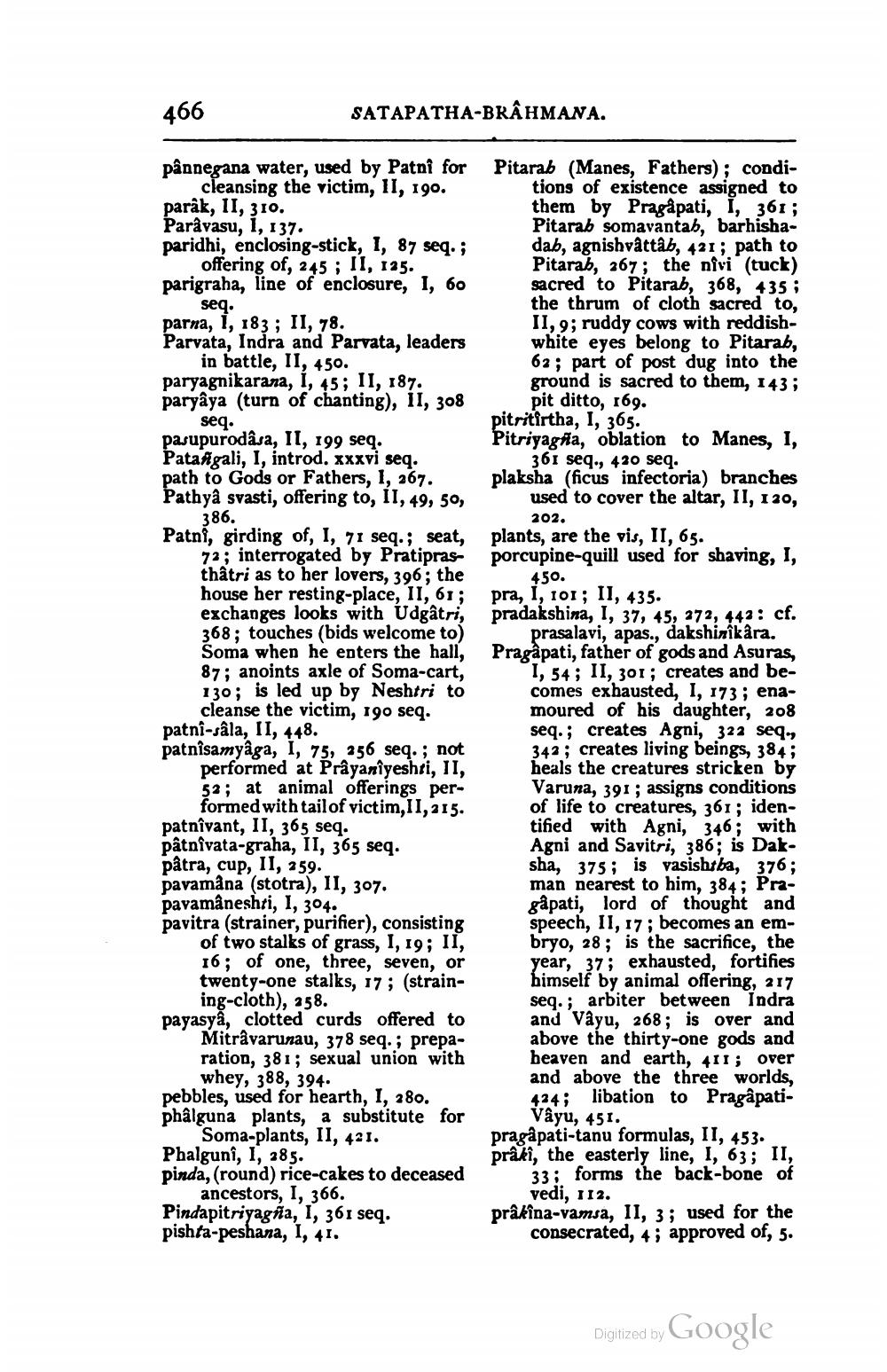________________
466
SATAPATHA-BRAHMANA.
pânnegana water, used by Patni for
cleansing the victim, II, 190. parak, 11, 310. Parâvasu, 1, 137. paridhi, enclosing-stick, 1, 87 seq. ;
offering of, 245; 11, 125. parigraha, line of enclosure, I, 60
seq. parna, 1, 183; II, 78. Parvata, Indra and Parvata, leaders
in battle, II, 450. paryagnikarana, I, 45; II, 187. paryâya (turn of chanting), II, 308
seq. pasupurodása, II, 199 seq. Patangali, I, introd. xxxvi seq. path to Gods or Fathers, I, 267. Pathyâ svasti, offering to, II, 49, 50,
386. Patni, girding of, I, 71 seq.; seat,
72; interrogated by Pratiprasthâtri as to her lovers, 396; the house her resting-place, II, 61; exchanges looks with Udgâtri, 368; touches (bids welcome to) Soma when he enters the hall, 87; anoints axle of Soma-cart, 130; is led up by Neshtri to
cleanse the victim, 190 seq. patni-sâla, II, 448. patnisamyaga, I, 75, 256 seq. ; not
performed at Prayaniyeshri, II, 52; at animal offerings per
formed with tailof victim, II, 215. patnîvant, II, 365 seq. pâtnivata-graha, II, 365 seq. påtra, cup, II, 259. pavamana (stotra), II, 307. pavamâneshri, I, 304. pavitra (strainer, purifier), consisting
of two stalks of grass, I, 19; II, 16; of one, three, seven, or twenty-one stalks, 17; (strain
ing-cloth), 258. pagasyă, clotted curds offered to
Mitrâvarunau, 378 seq.; preparation, 381; sexual union with
whey, 388, 394. pebbles, used for hearth, I, 280. phâlguna plants, a substitute for
Soma-plants, II, 421. Phalgunî, 1, 385. pinda, (round) rice-cakes to deceased
ancestors, I, 366. Pindapitriyagña, 1, 361 seq. pishta-peshana, 1, 41.
Pitarab (Manes, Fathers); condi
tions of existence assigned to them by Pragàpati, i, 361; Pitarab somavantab, barhishadab, agnishváttáb, 421; path to Pitarab, 267; the nivi (tuck) sacred to Pitarab, 368, 435; the thrum of cloth sacred to, II, 9; ruddy cows with reddishwhite eyes belong to Pitarab, 62; part of post dug into the ground is sacred to them, 143;
pit ditto, 169. pitritirtha, 1, 365. Pitriyagna, oblation to Manes, 1,
361 seq., 420 seq. plaksha (ficus infectoria) branches
used to cover the altar, II, 120,
202. plants, are the vis, II, 65. porcupine-quill used for shaving, I,
450. pra, I, 101; II, 435. pradakshina, I, 37, 45, 272, 441: cf.
prasalavi, apas., dakshinikára. Pragàpati, father of gods and Asuras,
1, 54; II, 301; creates and becomes exhausted, I, 173; enamoured of his daughter, 208 seq.; creates Agni, 322 seq. 342; creates living beings, 384; heals the creatures stricken by Varuna, 391; assigns conditions of life to creatures, 361; identified with Agni, 346; with Agni and Savitri, 386; is Daksha, 375; is vasishaba, 376; man nearest to him, 384; Pragâpati, lord of thought and speech, II, 17; becomes an embryo, 28; is the sacrifice, the year, 37; exhausted, fortifies himself by animal offering, 217 seg.; arbiter between Indra and Vayu, 268; is over and above the thirty-one gods and heaven and earth, 411; over and above the three worlds, 424; libation to Pragâpati
Vâyu, 451. pragapati-tanu formulas, II, 453. praxi, the easterly line, I, 63; II,
33; forms the back-bone of
vedi, 112. prâkina-vamsa, II, 3; used for the
consecrated, 4; approved of, 5.
Digitized by Google




